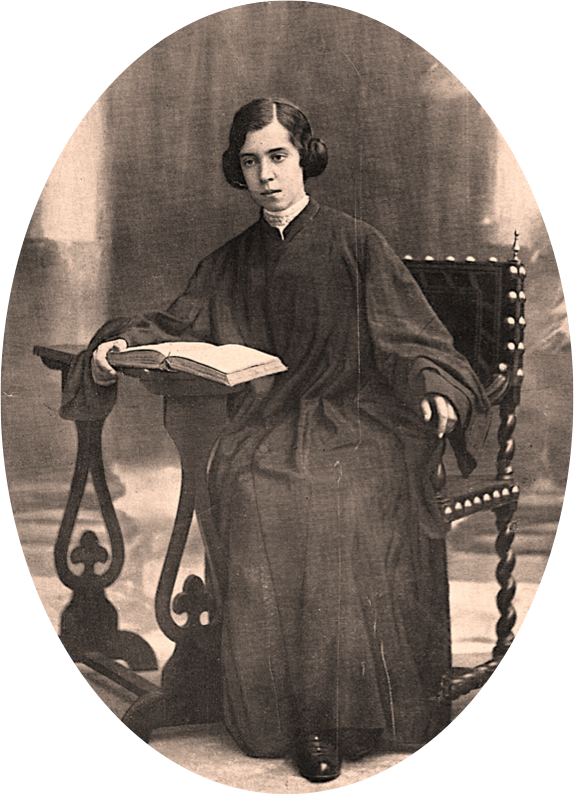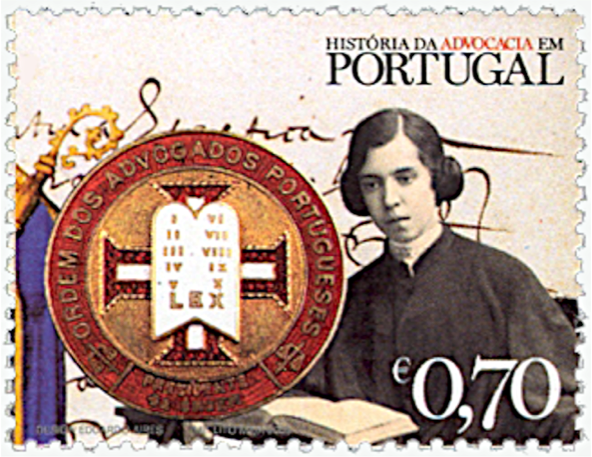
Born on the 9th of May of 1893, Regina da Glória Pinto de Magalhães Quintanilha de Sousa e Vasconcelos became the first woman to practice Law in Portugal, therefore setting an unprecedented important example for many other Portuguese women throughout the twentieth century.
Hailing from a wealthy family, Quintanilha received a most privileged education in comparison to the standards of the time, largely fomented by her mother, the writer and poet Josefa Quintanilha, where values such as study – mostly aimed towards the field of Letters – and work were systematically and even austerely transmitted.
After finishing secondary school in Porto, Regina Quintanilha joined the Faculty of Law of the University of Coimbra, in October of 1910, an unheard-of fact for the time, considering that there were still many obstacles imposed upon the admittance of women to universities – moreover, there is no record of a woman being able to study Law in Portugal up until then. Having been cherished, with enthusiasm, by her male colleagues throughout the whole course, Quintanilha managed to integrate herself with surprising ease into the elitist circle of Coimbra, being fully aware that she was surrounded by many candidates for future leaders of the country, such was the prestigious status of Coimbra´s Academy at the beginning of the century. António de Oliveira Salazar, who would be Portugal´s head of state for 40 years - having died shortly before the Carnation Revolution that overthrew, in 1974, his fascist regime - was one of Quintanilha´s colleagues, among other illustrious figures.
Taking advantage of the profound restructuring of the Academy, brought by the implantation of the Republic, in 1910, Quintanilha was able to complete Law School in only three years, while simultaneously attending a diversified number of subjects lectured at the recently created Faculty of Letters, as well as a few others taught at the Brotero Industrial School, among which Chemistry and Physics. Consequently, in 1913, taking into account her highly ambitious and swift academic route, she was granted authorization to practice Law by the Supreme Justice Court.
During that very same year, in November, she made her debut as a lawyer in Lisbon, an event that would be favorably covered by several newspapers, such as Diário de Notícias, O Século and República, as well as magazines, namely Ilustração Portuguesa and Ocidente. A Madrugada, the Republican League of Portuguese Women´s official newspaper, also echoed the sentiments of the general press, promptly regarding her entrance into the domain of the courts as an unmistakable triumph. Likewise, Quintanilha would become a member of a few female organizations, having joined the National Council of Portuguese Women and having been elected, in 1917, as president of the General Assembly of the Portuguese Women´s Crusade. In this regard, she advocated unrestricted intellectual equality between male and female rights, defending – prophetically, one might add - that educated women were perfectly capable of conciliating the role of tutors of their children with, say, a political office, where they would be encircled by great men.
Even though she performed functions of public notary and conservator of Land Registry, besides having lectured at the Maria Pia High School, in Lisbon, it was indeed within the field of Law that Regina Quintanilha concentrated her professional endeavors, both in Portugal and abroad.
She died in Lisbon, on the 25th of March of 1967.
*****
Nascida a 9 de Maio de 1893, Regina da Glória Pinto de Magalhães Quintanilha de Sousa e Vasconcelos tornou-se a primeira mulher a exercer advocacia em Portugal, assim abrindo um importante precedente no caminho que muitas outras mulheres portuguesas viriam a trilhar ao longo do séc. XX.
Proveniente de uma família abastada, Quintanilha viu ser-lhe proporcionada uma educação privilegiada para a época, maioritariamente impulsionada pela sua mãe, a escritora e poetisa Josefa Quintanilha, onde valores como o estudo - sobretudo focado no universo das letras - e o trabalho eram sistemática e até austeramente valorizados.
Após a conclusão do ensino secundário no Porto, Regina Quintanilha ingressou na Faculdade de Direito da Universidade de Coimbra, em Outubro de 1910, o que constituiu um facto inédito, uma vez que eram ainda colocados sérios entraves à admissão de mulheres no ensino superior - com efeito, não existe qualquer registo de uma mulher ter conseguido cursar Direito até então. Acarinhada, com entusiasmo, pelos colegas masculinos ao longo de todo o seu percurso académico, Quintanilha integrou-se com uma surpreendente naturalidade no meio elitista de Coimbra, plenamente consciente do facto de se encontrar ladeada de muitos candidatos a futuros governantes do país, tal era o grau de prestígio de que a Academia Coimbrã gozava na sociedade portuguesa da época. A título de exemplo ilustrativo, Quintanilha foi colega, entre outras figuras, de António de Oliveira Salazar e de Gonçalves Cerejeira.
Tirando partido da profunda reestruturação operada na Academia na sequência da implantação da República, em 1910, Quintanilha acabou por completar o curso de Direito em apenas três anos, conseguindo ainda, em simultâneo, frequentar um diversificado leque de cadeiras leccionadas na Faculdade de Letras – recém-criada pela República - e assistir a algumas aulas ministradas na Escola Industrial Brotero, entre as quais Química e Física. Em 1913, atendendo à sua ambiciosa formação e célere percurso académico, foi-lhe autorizado o exercício de advocacia pelo Supremo Tribunal de Justiça.
Nesse mesmo ano, em Novembro, estreou-se como advogada em Lisboa, acontecimento que mereceu cobertura noticiosa por parte de diversos jornais, tais como o Diário de Notícias, O Século ou A República, e revistas, designadamente a Ilustração Portuguesa e a Ocidente, que lhe teceram críticas bastante elogiosas. A estas publicações juntou-se A Madrugada, o jornal da Liga Republicana das Mulheres Portuguesas, que prontamente considerou a sua entrada no universo dos tribunais um triunfo insofismável. Quintanilha, de resto, haveria também de se tornar membro de algumas organizações femininas, tendo militado no Conselho Nacional das Mulheres Portuguesas e sido eleita, em 1917, presidente da Assembleia-Geral da Cruzada das Mulheres Portuguesas. A este respeito, defendia a incondicional equidade intelectual entre direitos masculinos e femininos, considerando – profeticamente, poder-se-á acrescentar - que as mulheres instruídas estavam perfeitamente aptas a conciliar o papel de educadoras perante os seus filhos com um cargo político, a título de exemplo, circundadas por grandes homens.
Embora tenha desempenhado funções de notária e de conservadora do Registo Predial, para além de ter leccionado no Liceu Maria Pia, em Lisboa, foi efectivamente na esfera da advocacia que Quintanilha concentrou a sua actividade profissional, tanto em Portugal como no estrangeiro.
Morreu em Lisboa, a 25 de Março de 1967.

References:
- Regina Quintanilha, wikipédia.
- CASTRO, Zília, ESTEVES, João (dir.), Dicionário no Feminino (séculos XIX-XX), Lisboa, Livros Horizonte, 2005.
- SAMARA, Maria Alice, Operárias e Burguesas: As Mulheres no Tempo da República, A Esfera dos Livros, Lisboa, 2007.